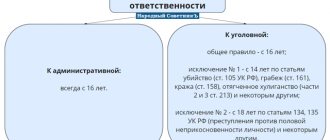Arson is recognized as a generally dangerous method of committing a crime and is expressed in deliberate actions that cause harm or entail the destruction of property using combustion.
The Criminal Code of the Russian Federation distinguishes between intentional damage to property using fire and damage resulting from careless behavior that resulted in a fire. In the first case, Part 2 of Article 167 is applied, and in the second - Article 168 of the Criminal Code of the Russian Federation. If the actions were intentional, the punishment will be more severe.
Rule
This is a word we recommend remembering. To check the correct spelling, use a spelling dictionary of the Russian language, for example, edited by D.N. Ushakov. The prefix “under-” is written with the letter “o”.
The letter o after the hissing words w, ch, sh, sh is written:
1) under stress in the roots of Russian words. where there is no alternation with e ;
Examples: heartburn , sh o v, sh o rokh
2) In an unstressed position in the roots of some words of foreign origin and proper names;
Examples : chocolate , jokey , Chopin , Scotland
3) Under stress in suffixes and endings of nouns and adjectives, in suffixes of adverbs.
Examples: girly , big , fresh .
The letter e is written with an accent:
1) in the roots of Russian words, if alternation with e ;
Examples: liver (liver), black (turn black), whisper (whisper), yellow (yellow), alkali (alkaline)
2) in the suffix -yov (yva)- and verb endings;
Examples: uproot, set fire (set paper on fire)
3) in the suffix -ёr in nouns of foreign origin;
Examples: conductor, retoucher, massager, boyfriend (of Russian origin, but written in a similar way to foreign words).
4) in the forms of pronouns and words formed from them;
Examples: what, how much, worthless.
5) suffixes of participles, verbal adjectives and nouns.
Examples: stewed, divulged, burned, overnight, twine, stew.
Examples of use and citations
Set fire
paper. The light crawled like a blue, burning bee. He locked the doors, Enveloped in the cold, bitter darkness.
“Arson” - Bely Andrey
My grandfather, having lost his mind in his eightieth year, set fire
his own home and died in the flames, rescuing a pipe forgotten in the bedroom, the only thing he was reasonable about. My father…
“Zurbagan Shooter” - Green Alexander
And about arson
and there is no need to say: let the one whom the sexton had the desire to set on fire be carefully guarded. The superfluous and banned priest Molchanov, _to stop the outrages he is committing (?!)_ - for six months in...
Source
How to spell correctly (stress and word composition)
In the case of how to correctly write “arson” or “arson”, you should consult a dictionary. It states that each option is correct. But these concepts are used in different cases. In both variants, the stress is placed on the second syllable. The initial syllable comes with the letter "o".
The first word, arson, is a noun that denotes an action committed by an unknown person that led to a fire. A phrase such as “arson at home” uses the letter “o”. The noun consists of the prefix “under” and the root “zhog”, and also answers the question “what?”.
An option such as “arson” is spelled correctly, but is mentioned in a different sense. This is a masculine verb that describes the nature of a previously performed action. This part of speech gives answers to the questions “what did you do?” What did you do?". It is impossible to carry out morphemic analysis in this case, because the word has no visible significant parts.
Example sentences
- Vasily set fire to an electrical equipment warehouse, which burned to the ground, for which the man faces serious punishment.
- Two criminals set fire to a beauty salon in one of the central districts of Moscow.
- My grandfather lost his mind in his eighties, set fire to the mansion and died trying to save his most valuable treasure - a gold watch.
- At midnight, an unknown person set fire to the door of an apartment on Marshal Zhukov Avenue.
How to spell it wrong
In the debate about how to correctly spell “arson” or “arson,” the answer is obvious—there is no wrong option. Each word has an unmistakable spelling, but is used in different contexts.
Values
The words “arson” and “set fire” are in some respects related to the root “-zhog”/“-zhog”, meaning the burning of something flammable, and the prefix “pod-”, in our case indicating the contact of the igniter with a combustible material. But replacing just one vowel radically changes the meaning of the word, and even its belonging to parts of speech. In Fig. on the right is shown how a man set fire to a fire with a match , and next to it - how the madman Herostratus laughs wildly, having set fire to the Temple of Artemis in Ephesus.
Grammar
“Arson” is an inanimate masculine noun of the 2nd declension in the school tradition (I academic). Consists of the prefix “pod-” and the root “-zhog”. Case forms:
The word “set fire” is a perfect, transitive and irrevocative verb of the 1st conjugation. Consists of the prefix “under-” and the root “-zhet”. Placement of stress and separation by hyphens . The corresponding imperfect verb is “to set fire”; intransitive “self-ignite” (colloquial synonym for “spontaneously combust”); reflexive “set yourself on fire” (attempt suicide by self-immolation or also a colloquial synonym for “get burned”).
Imperfection or perfection of the form of the verb indicates the incompleteness or completeness of the action: yes, this object (substance) is now being set on fire, but whether it will light up and flare up is still unclear, which means “to set fire” is an imperfect verb. But if it caught fire and is burning, yes, it was possible to set it on fire, it was set on fire, the action (set fire) was completed, the verb “set fire” is perfect.
“Transitional” means that the flammable material is not ignited by itself, but by someone or something (a spark from a short circuit, for example), that is, the action passes from the igniter to the ignited. But if, say, you throw on a lot of oily technical rags and leave them like that, then due to internal self-heating in the presence of atmospheric moisture, over time it will spontaneously ignite, self-ignite - the dangerous garbage will become its own arsonist, and the corresponding verb will be intransitive.
Non-reflexive means that the action is not directed towards itself (there is no postfix (after-ending) “-sya” or “-sya”). On the contrary, someone who commits self-arson (self-immolation; sad, but it happens), having doused himself with fuel, sets himself on fire.
The verb “to set fire” is conjugated according to persons in this way:
Active past participle set fire to ; passive set on fire Past participle set fire .
Author: Artur Aleksandrovich Sadov, linguist-typologist
Source
“Arson” or “arson”, how to write correctly?
Depending on the meaning of the context, we will choose the verb “set fire” in the past tense form or the noun “arson”, in the root of which the letter “o” is written after the hissing word.
The words “arson” and “arson” sound exactly the same, but are spelled differently. In order to learn to distinguish them and, accordingly, make the right choice in writing the letters “o” or “e” after the sibilant at the root, let’s turn to the context and try to find out what part of speech they are. The choice of their writing directly depends on this.
How do you spell “arson”?
For the modern Russian language, especially on the Internet, distortion of words and their deliberate incorrect use are not uncommon. Nevertheless, in any situation it is important to remain an educated person, including during correspondence on the World Wide Web. Some words can be misleading, so in this article we'll look at how to spell "arson" or "arson".
Spelling of the word "set on fire"
Volodya lit a fire made of dry resinous logs and hung a pot of water over it.
In this sentence, the word we are interested in denotes an action and answers the question:
Based on these grammatical features, we determine that the word “set fire” is a verb in the past tense singular masculine form, formed from the infinitive “set fire”:
Comparing these verbal forms, we note one important feature: in all forms, the vowel “е” is fluent, except for the masculine form. Which letter should you choose after the hissing word in the spelling of this word, “e” or “o”?
Let's analyze the word according to its composition to find out in which part of it there is a spelling problem:
set fire -0- - prefix/root/zero suffix/ending;
To make this morphemic composition of the masculine form clear, let us compare it with the composition of the feminine form, which has all the morphemes:
Spelling the word "arson"
The sudden arson of a haystack alarmed the entire village.
To find out the spelling of this word, let's determine its part-speech affiliation. In the example sentence given as an example, this word denotes an object and answers the question: what?
In addition, it has an agreed definition in the form of an adjective and an inconsistent definition expressed by a noun in the genitive singular form:
This means that this is a noun, which, in order to be distinguished from the spelling of a homonymous (similar) verb, is written differently, namely: with the letter “o” after the sibilant at the root:
burn - prefix/root/ending.
Such different spellings were introduced so that the form of the verb could be distinguished from the noun. Words with the same root, most of which are nouns, are written in the same way with the letter “o” at the root. Let's compare them with the writing of similar-sounding verb forms:
The root zheg-/zhog- is written with the letter “е” in verbs and participles, and with the letter “o” in nouns and adjectives.
Let's summarize
In the context, we distinguish the form of the past tense singular masculine verb “set fire” (fire, stove, paper, match) and the noun “arson”, which can have a definition.
Source
Arson and arson
Depending on the meaning of the context, we will choose the verb “set fire” in the past tense form or the noun “arson”, in the root of which the letter “o” is written after the hissing word.
The words “arson” and “arson” sound exactly the same, but are spelled differently. In order to learn to distinguish them and, accordingly, make the right choice in writing the letters “o” or “e” after the sibilant at the root, let’s turn to the context and try to find out what part of speech they are. The choice of their writing directly depends on this.
Conclusion
Sometimes you have to deal with words that sound the same, but have different spellings. Therefore, the thought consciously arises of how to spell the word “arson” or “arson”. It is worth noting that both options are mentioned equally in many cases, but they carry different meanings.
In this article we dealt with the spelling of these words. It is necessary to remember that if you have any doubts about the spelling, you should consult a dictionary, because sometimes even one letter significantly changes the meaning of a sentence.
Spelling of the word "set on fire"
Volodya lit a fire made of dry resinous logs and hung a pot of water over it.
In this sentence, the word we are interested in denotes an action and answers the question:
Based on these grammatical features, we determine that the word “set fire” is a verb in the past tense singular masculine form, formed from the infinitive “set fire”:
Comparing these verbal forms, we note one important feature: in all forms, the vowel “е” is fluent, except for the masculine form. Which letter should you choose after the hissing word in the spelling of this word, “e” or “o”?
Let's analyze the word according to its composition to find out in which part of it there is a spelling problem:
set fire -0- - prefix/root/zero suffix/ending;
To make this morphemic composition of the masculine form clear, let us compare it with the composition of the feminine form, which has all the morphemes:
popodogla - prefix/root/suffix/ending.
Let's remember the spelling rule:
Let's check how this rule works:
How to spell correctly (stress and word composition)
In the case of how to correctly write “arson” or “arson”, you should consult a dictionary. It states that each option is correct. But these concepts are used in different cases. In both variants, the stress is placed on the second syllable. The initial syllable comes with the letter "o".
The first word, arson, is a noun that denotes an action committed by an unknown person that led to a fire. A phrase such as “arson at home” uses the letter “o”. The noun consists of the prefix “under” and the root “zhog”, and also answers the question “what?”.
An option such as “arson” is spelled correctly, but is mentioned in a different sense. This is a masculine verb that describes the nature of a previously performed action. This part of speech gives answers to the questions “what did you do?” What did you do?". It is impossible to carry out morphemic analysis in this case, because the word has no visible significant parts.
Example sentences
- Vasily set fire to an electrical equipment warehouse, which burned to the ground, for which the man faces serious punishment.
- Two criminals set fire to a beauty salon in one of the central districts of Moscow.
- My grandfather lost his mind in his eighties, set fire to the mansion and died trying to save his most valuable treasure - a gold watch.
- At midnight, an unknown person set fire to the door of an apartment on Marshal Zhukov Avenue.
How to spell it wrong
In the debate about how to correctly spell “arson” or “arson,” the answer is obvious—there is no wrong option. Each word has an unmistakable spelling, but is used in different contexts.
Spelling the word "arson"
The sudden arson of a haystack alarmed the entire village.
To find out the spelling of this word, let's determine its part-speech affiliation. In the example sentence given as an example, this word denotes an object and answers the question: what?
In addition, it has an agreed definition in the form of an adjective and an inconsistent definition expressed by a noun in the genitive singular form:
This means that this is a noun, which, in order to be distinguished from the spelling of a homonymous (similar) verb, is written differently, namely: with the letter “o” after the sibilant at the root:
Arson, which was covered by the intent of the perpetrator
Intentional arson is punishable by forced labor or imprisonment. In both cases, the term can be assigned up to 5 years.
In this case, in exceptional cases, it is possible to apply the sanction established by part 1 of Art. 167, namely, when there was completely no threat of harm to others. The court has the right to choose one of the following alternative sanctions:
- a fine of up to 40,000 rubles;
- compulsory work, the total volume of which does not exceed three hundred and sixty hours;
- arrest – less than 3 months;
- correctional labor for no more than one year;
- imprisonment or forced labor, each not exceeding 2 years.
Part 3 of Article 261 of the Criminal Code of the Russian Federation, in addition, contains criminal sanctions for setting fire to a forest, which can be imposed by the court as a fine from 500,000 to 1,000,000 rubles or imprisonment of the convicted person for eight years with the simultaneous recovery of a sum of money in the range of 200,000 – 500,000 rubles. And if the loss of natural resources amounts to more than 50 thousand rubles in monetary terms (large amount), then the most severe type of punishment can be imposed.
Certain circumstances may indicate that the arson was committed with intent:
- artificially created conditions for instant fire coverage of a larger area;
- the use by the perpetrator of auxiliary household products (hay, fuel) or flammable liquids, as well as explosives;
- presence at the crime scene of signs of concealment of traces of arson (damaged consumer electronics, shorted wires).
Important
Responsibility for this crime begins upon reaching 14 years of age.
Article 167 applies when, as a result of illegal actions, damage to someone else’s property is caused, otherwise there is no corpus delicti. That is, the object is a sign of a crime, the presence of which is mandatory. This harm must be significant, which, according to approx. 2 tbsp. 158, is determined by the property status of the person recognized as a victim and cannot be less than five thousand rubles.











